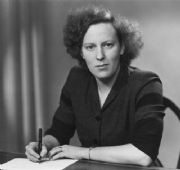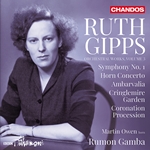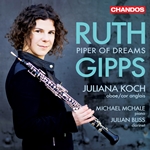Ruth Gipps
Ruth Gipps - English pianist, composer and conductor. Her music education began at the age of three at the Bexhill School of Music, where her mother was principal. She gave her first performance aged four, and her first composition was published by Forsyth Brothers when she was eight. She gained her performer's ARCM at 15 and in the same year entered the RCM, London. Here she studied composition with Gordon Jacob, R.O. Morris and Vaughan Williams, the oboe with Leon Goossens, and the piano with Arthur Alexander and Kendall Taylor. On leaving college she studied the piano with Matthay. While at the RCM she won a number of prizes for composition, including the Cobbett Prize and the grade five composition prize for her First Symphony (1942). Her tone poem Knight in Armour was conducted by Sir Henry Wood on the last night (22 August) of the 1942 Promenade concerts. In 1948 she obtained a DMus at the University of Durham.
While trying to establish herself as a concert pianist Gipps took a position playing oboe and english horn with the City of Birmingham Orchestra (1944–5), whose conductor, George Weldon, encouraged her to undertake conducting work. From this time on her career took a change of direction. She became chorus master of the City of Birmingham Choir and later conductor of the Birmingham Co-Operative Amateur Orchestra. At this time there were very few female conductors, and gaining support often proved very difficult. Undeterred, Gipps decided to set up her own orchestras. In 1955 she founded the London Repertoire Orchestra, which she ran until 1986. In 1961 she formed the professional Chanticleer Orchestra; among the orchestras she conducted were the LSO and the Boyd Neel and Pro Arte Orchestras. Between 1960 and 1991 Gipps worked as a music professor at Trinity College of Music (1960–66), the RCM (1967–77) and Kingston Polytechnic (1977–9). In 1967 she became chairwoman of the Composers' Guild of Great Britain, in which role she was instrumental in establishing the British Music Information Centre. She was awarded an OBE in 1981.
Gipps's long and varied career reflected her energy and multi-faceted musical ability, yet it was as a composer that she made her most sustained contribution, particularly in the genres of orchestral and chamber music. Her music parallels other British composers who were influenced by the folksong revival and the new Franco-Russian movement. Her style is easily accessible and rich in character, marked by highly melodic tonal and modal themes, chromatically complex harmonic language and vibrant orchestration.














 My Wish List
My Wish List













